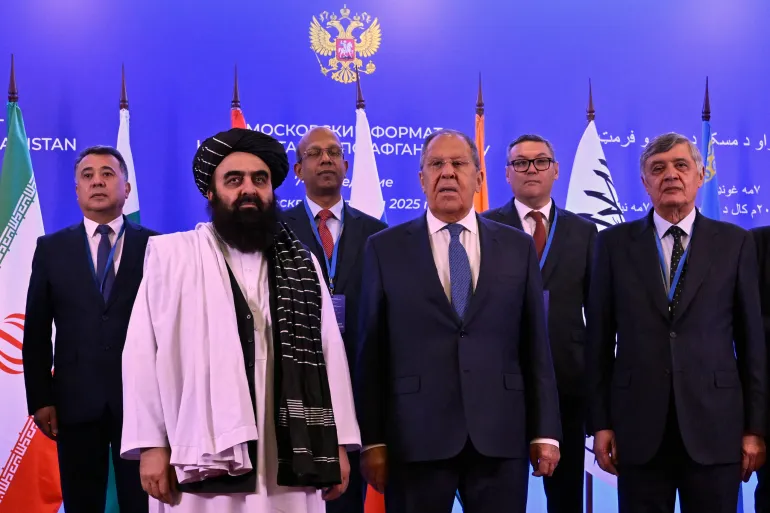United States President Donald Trump is pushing hard. He wants to regain control of Bagram Air Base in Afghanistan. This former U.S. hub was abandoned in 2021. However, Trump’s ambition has met strong resistance. Regional powers have formed a rare unified front. They stand against any renewed U.S. military presence. Bagram Air Base
This joint opposition emerged strongly on Tuesday. Members of the Moscow Format of Consultations on Afghanistan issued a joint statement. Consequently, this statement effectively rejected Washington’s demands. It underscores the changing geopolitical reality in Central Asia.
The Unacceptable Presence: Regional Powers Unite Bagram Air Base
The Moscow Format meeting included key regional players. Significantly, this group features nations with often complex relationships. They released a strongly worded joint statement. They “called unacceptable the attempts by countries to deploy their military infrastructure in Afghanistan.” This message was clearly aimed at the United States.
A Diverse Coalition
The unified front is particularly noteworthy. For example, it includes geopolitical rivals. The core members opposing the U.S. return are:
- Russia
- China
- Iran
- Pakistan
- Central Asian Nations
Furthermore, India, a long-time U.S. strategic partner, also backed the statement. This action signals India’s complicated position. It shows their diplomatic shift toward regional stability. Therefore, the statement represents a consensus. The regional balance should not be disturbed by external military forces.
The Shared Objection
The overarching objection is clear. Regional stability and peace are paramount. The countries believe foreign military infrastructure does not serve regional interests. Instead, they argue it risks fueling extremism. Consequently, it could destabilize neighboring states. Therefore, the former colonial-era presence is explicitly rejected.
The Taliban’s Firm Rejection: Sovereignty is Non-Negotiable Bagram Air Base
The regional position strongly aligns with Kabul’s stance. The Taliban government has flatly rejected Trump’s demands. The Chief of Staff of Afghanistan’s Ministry of Defense spoke plainly. He stated that a deal over “even an inch of Afghanistan’s soil is not possible.”
A Symbol of Victory
For the Taliban, holding Bagram is deeply symbolic. It represents their ultimate victory over foreign occupation. Thus, ceding the base would be a profound humiliation. It would undermine the very sovereignty they fought to reclaim.
The Taliban’s Foreign Minister, Amir Khan Muttaqi, confirmed this policy. He emphasized that Afghanistan will never accept a foreign military presence. Therefore, the 1996 Doha Agreement is invoked. The Taliban cite the U.S. pledge to not threaten Afghanistan’s territorial integrity.
China: The Primary Strategic Concern Bagram Air Base
President Trump’s primary motivation for reclaiming Bagram is geopolitical. Specifically, he views the base as a strategic asset against China.
Monitoring Nuclear Activity
Trump repeatedly stressed the base’s location. He noted that Bagram is geographically close to China’s sensitive Xinjiang region. Furthermore, this area is near where China develops its nuclear weapons. Therefore, reclaiming Bagram would provide the U.S. with a critical vantage point. It would enable intelligence, surveillance, and reconnaissance operations.
Economic and Security Threats
China views a renewed U.S. presence as a direct threat. China is heavily invested in Afghanistan’s future. For instance, Beijing has deepened economic ties. They are eyeing infrastructure projects. They are also interested in Afghanistan’s vast mineral reserves. Consequently, a U.S. military foothold would jeopardize these interests. China will not tolerate a presence that threatens its regional security or economic expansion.
Iran and Russia: The Geopolitical Axis Bagram Air Base
Iran and Russia share similar concerns. They view any U.S. return as a direct provocation.
Iran’s Security Fears
Iran sees U.S. military facilities as potential targets. Recently, the region saw heightened tensions. Iran and Israel fought a brief war. Therefore, Tehran views a U.S. base nearby as a severe security risk. Senior Iranian officials warned that a U.S. presence would face “serious resistance.” They argue that military interventions are destabilizing for the region.
Russia’s Regional Influence
Russia has strengthened its position in Afghanistan. It was the first major power to formally recognize the Taliban government. Furthermore, Russia opposes any move that reasserts U.S. hegemony. Moscow seeks to maintain the fragile regional balance. Therefore, a renewed American military presence is unacceptable. Russia’s Foreign Ministry spokesperson stated that Washington’s withdrawal was “shameful.” They further warned that the Afghan people will not abandon their national sovereignty.
The Logistical and Diplomatic Nightmare
Even if the political will existed, the operational challenges are immense. Reclaiming Bagram Air Base would require substantial effort.
The Cost of Re-Invasion
Experts caution against a military option. They suggest seizing the base would look like a re-invasion. This would require more than 10,000 troops. Furthermore, it would demand advanced air defenses and massive logistical support. Such an undertaking would be prohibitively costly. It is also politically untenable for Washington.
The Price of Negotiation
Alternatively, a diplomatic deal is equally challenging. The U.S. would need major concessions. These might include recognizing Taliban rule. They would certainly involve lifting economic sanctions. However, these are highly toxic concessions in Washington. The Taliban, supported by their new international partners, have little incentive to concede their sovereignty.
The Path of Leverage, Not Conquest
In conclusion, Trump’s demand appears more rhetorical than practical. It signals a desire to reassert U.S. influence. This is in a region increasingly shaped by China and Russia. The Bagram Air Base remains a powerful strategic asset. However, it is no longer U.S. ground. The unified rejection from regional powers and the Taliban’s firm stance confirm this new geopolitical reality. The path forward is difficult. It requires astute diplomacy over military force.
Read More Articles Click Here.
